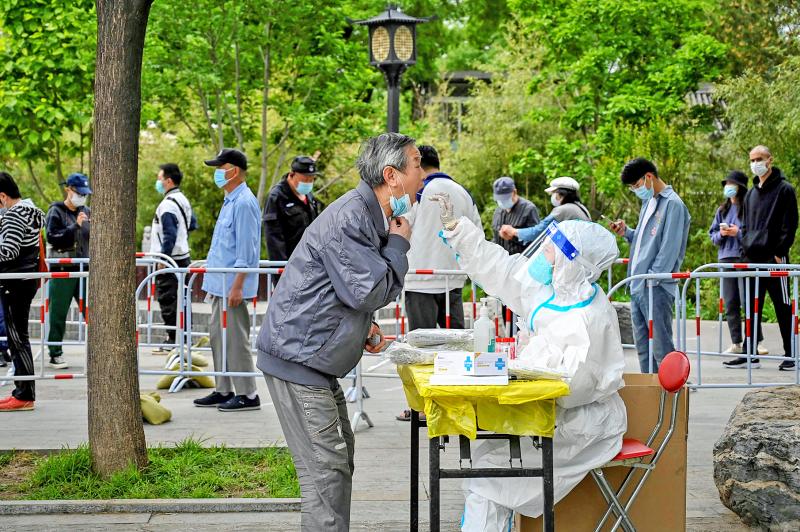China’s capital, Beijing, yesterday began a fresh round of mass testing for COVID-19, and shut more bus routes and metro stations as it seeks to avert the fate of Shanghai, where millions of residents have been locked down for more than a month.
The draconian movement curbs on Shanghai, an economic and financial hub, have caused frustration among its 25 million residents, and triggered rare protests over issues such as access to food and medical care as well as loss of income.
While some people have been let out for light and air in recent weeks, residents for the most part say they still cannot leave their housing compounds.

Photo: AFP
Shanghai cases have fallen for eight straight days and the city has said its outbreak is under effective control, allowing it to shut some of the makeshift hospitals it raced to build as case numbers ballooned.
However, authorities have also said that a full easing is still far off.
In an announcement underscoring that expectation, Shanghai officials postponed the city’s gaokao (高考) university entrance exam to early July. It took place in June last year and the last time it was postponed was in 2020, during the initial virus outbreak.
Chinese Communist Party Committee Secretary of Shanghai Li Qiang (李強), a close ally of Chinese President Xi Jinping (習近平), told a government meeting on Friday that it was “necessary to issue military orders at all levels, and take more resolute and powerful actions to overcome the great war and great tests,” an official statement said.
The number of infections in Shanghai outside areas under lockdown — a gauge of whether the city can further reopen — fell to 18 on Friday from 23 the day before. Total new cases declined slightly to about 4,000, data released yesterday showed.
Shanghai is also building thousands of permanent polymerase chain reaction testing stations, in line with other cities, as China looks to make regular testing a feature of everyday life.
China’s COVID-19 policy is increasingly out of step with much of the rest of the world, where governments have eased restrictions, or dropped them altogether, in a bid to “live with COVID-19” even as infections spread.
Beijing is striving to avoid an explosion in cases like that of Shanghai by conducting rounds of mass testing, banning restaurant dining-in services in multiple districts and shutting more than 60 subway stations, about 15 percent of the network.
Yesterday, it launched the first of three new rounds of daily testing in its biggest district, Chaoyang, home to embassies and large offices, and said residents in other areas where cases had been reported needed to take tests on the weekend.
The city reported 45 new symptomatic COVID-19 cases for Friday, down from 55 cases a day earlier. It recorded eight asymptomatic cases, which China counts separately, versus 17 a day earlier.

INVESTIGATION: The case is the latest instance of a DPP figure being implicated in an espionage network accused of allegedly leaking information to Chinese intelligence Democratic Progressive Party (DPP) member Ho Jen-chieh (何仁傑) was detained and held incommunicado yesterday on suspicion of spying for China during his tenure as assistant to then-minister of foreign affairs Joseph Wu (吳釗燮). The Taipei District Prosecutors’ Office said Ho was implicated during its investigation into alleged spying activities by former Presidential Office consultant Wu Shang-yu (吳尚雨). Prosecutors said there is reason to believe Ho breached the National Security Act (國家安全法) by leaking classified Ministry of Foreign Affairs information to Chinese intelligence. Following interrogation, prosecutors petitioned the Taipei District Court to detain Ho, citing concerns over potential collusion or tampering of evidence. The

NEGOTIATIONS: Taiwan has good relations with Washington and the outlook for the negotiations looks promising, Minister of Economic Affairs J.W. Kuo said Taiwan’s GDP growth this year is expected to decrease by 0.43 to 1.61 percentage points due to the effects of US tariffs, National Development Council (NDC) Minister Paul Liu (劉鏡清) said at a meeting of the legislature’s Economics Committee in Taipei yesterday, citing a preliminary estimate by a private research institution. Taiwan’s economy would be significantly affected by the 32 percent “reciprocal” tariffs slapped by the US, which took effect yesterday, Liu said, adding that GDP growth could fall below 3 percent and potentially even dip below 2 percent to 1.53 percent this year. The council has commissioned another institution

NEGOTIATIONS: The US response to the countermeasures and plans Taiwan presented has been positive, including boosting procurement and investment, the president said Taiwan is included in the first group for trade negotiations with the US, President William Lai (賴清德) said yesterday, as he seeks to shield Taiwanese exporters from a 32 percent tariff. In Washington, US Trade Representative Jamieson Greer said in an interview on Fox News on Thursday that he would speak to his Taiwanese and Israeli counterparts yesterday about tariffs after holding a long discussion with the Vietnamese earlier. US President Donald Trump on Wednesday postponed punishing levies on multiple trade partners, including Taiwan, for three months after trillions of US dollars were wiped off global markets. He has maintained a 10 percent

TRADE: The premier pledged safeguards on ‘Made in Taiwan’ labeling, anti-dumping measures and stricter export controls to strengthen its position in trade talks Products labeled “made in Taiwan” must be genuinely made in Taiwan, Premier Cho Jung-tai (卓榮泰) said yesterday, vowing to enforce strict safeguards against “origin laundering” and initiate anti-dumping investigations to prevent China dumping its products in Taiwan. Cho made the remarks in a discussion session with representatives from industries in Kaohsiung. In response to the US government’s recent announcement of “reciprocal” tariffs on its trading partners, President William Lai (賴清德) and Cho last week began a series of consultations with industry leaders nationwide to gather feedback and address concerns. Taiwanese and US officials held a videoconference on Friday evening to discuss the